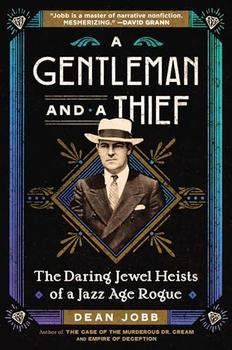Summary | Excerpt | Reading Guide | Reviews | Beyond the Book | Readalikes | Genres & Themes | Author Bio

The Daring Jewel Heists of a Jazz Age Rogue
by Dean Jobb
When bootlegger Larry Fay opened the El Fey earlier that year, he hired Guinan to recruit musicians and dancers, emcee the floor shows, and welcome customers with her cheeky trademark greeting. A "formidable woman," was the verdict of critic and journalist Edmund Wilson, "with her pearls, her prodigious glittering bosom, her abundant and beautifully bleached yellow coiffure, her bear-trap of shining white teeth." A saucy Mae West prototype, she presided over her domain, mused one journalist who dropped by, "like a gorgeous tamer who had just let herself into a large cage of pet tigers."
As many as two hundred could be packed into the club's narrow, smokefilled room, but no more than a half dozen couples could sardine onto the tiny patch of dance floor. A jazz band and Guinan's outsized personality attracted the likes of actor Al Jolson, boxer Jack Dempsey and, on this night, a future king of England. Guinan, ever the cheeky self-promoter, would later boast to audiences that she had once hosted the world's most famous prince, "a little fellow who never had a backyard or a dirty face."
The prince had convinced a few of his companions to join Gibson on the lark. Their destination was Broadway. The White Light Belt, New Yorkers called it, or simply the Big Street. The grid of avenues and cross streets of the theater district—an area known as the Roaring Forties, with the El Fey at its epicenter—was jammed with restaurants, nightclubs, and cabarets. This was where "society, the stage, the movies and the wealth and the fashion of the town go," noted the Daily News, "in the hours when the gay set is at its best." Alcohol flowed as if Prohibition had never become the law of the land. To stymie the federal agents who conducted periodic raids, the El Fey stashed its liquor in the building next door, passing bottles into the club as needed through a hole in the wall that could be concealed with a loose brick.
The El Fey was known for the young, scantily clad dancers who performed and, between numbers, mingled with the men in the audience. "It was a bacchanalian feast, a Roman orgy, a politician's clambake, all rolled into one," recalled one of Guinan's friends, the theater producer and publicist Nils T. Granlund. A newspaper illustrator would later imagine the prince and Gibson seated at a table and offering toasts to a lineup of bob-haired showgirls in low-cut outfits, one of them wearing a top hat presumably plucked from the royal head. The caption: "Princely Fun."
At the El Fey and other stops, Dr. Gibson would recall, the prince's companions referred to him as Mr. Windsor, "a high-ranking member of the British diplomatic corps." The subterfuge suited the prince's guide. He wasn't a doctor, and his name wasn't Gibson.
They hopped from the El Fey to what Gibson billed as "a swell spot" on East Fifty-Ninth Street. The Club Deauville's "atmosphere of mystery," press reports noted, attracted "many socially prominent New Yorkers." Members of the house orchestra, Clark's Hawaiians, navigated between tables as they took requests and played music from the islands. It was a slow night, with only a few tables occupied and the occasional couple fox-trotting around the dance floor. Someone offered the prince a lei, which he draped around his neck. He praised the fine tenor voice of one of the singers, then asked the band to play his favorite Hawaiian song, a chart-topping hit that year called "Aloha 'Oe" ("Farewell to Thee"). Gibson grabbed a seat beside the prince, and they chatted, about nothing in particular—Broadway shows, popular tunes of the day, how Prohibition made it so hard to find decent liquor, even in fun-loving, booze-soaked New York. Gibson helped himself to champagne but noticed that the prince drank little. A third stop was the Florida Club, on West Fifty-Fifth Street, where a piano was set up in the middle of the room and the group took in a musical review.
The two men hit it off. The prince struck Gibson as "a real fellow. A real sport." They were almost the same age. Both were unmarried, and both had served in the war—Gibson as a medic in the US Army, the prince as an officer in the Grenadier Guards, who toured front-line trenches to boost morale. Gibson's posh accent masked his working-class roots in Worcester, Massachusetts. He seemed to know everyone who mattered, dropping names of the rich and famous with ease. His wit, charm, and flawless manners were those of a well-educated, well-bred member of a family that was wealthy and important. And in a tux—the work clothes of his trade—he looked the part, too. For a nighttime foray like the one to the Cosden estate, Gibson "dressed faultlessly in evening clothes," his future wife, Anna Blake, would note. "He always looked handsome in them."
Excerpted from A Gentleman and a Thief by Dean Jobb. Copyright © 2024 by Dean Jobb. Excerpted by permission of Algonquin Books. All rights reserved. No part of this excerpt may be reproduced or reprinted without permission in writing from the publisher.
Your guide toexceptional books
BookBrowse seeks out and recommends the best in contemporary fiction and nonfiction—books that not only engage and entertain but also deepen our understanding of ourselves and the world around us.